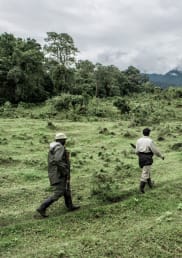Marawi locals form reconstruction conflict watch ahead of groundbreaking
Marawi locals launched today the Marawi Reconstruction Conflict Watch (MRCW), an independent and neutral multistakeholder group that will continuously engage with government, its private sector partners, aid agencies, and other civil society organizations to help mitigate violent conflict that may result from the reconstruction process.

Task Force Bangon Marawi (TFBM), the government arm leading the rehabilitation process, had previously announced it will begin reconstruction of the city’s most affected area (MAA), in late August.
Families and clans affected by the conflict, internally-displaced businesses, religious leaders, community leaders including women and the youth, academia, and NGO representatives compose the MRCW.
In a statement, Sultan Nasser D. Sampaco, member of the MRCW and chairman of the Marawi Sultanate League, said that the group intends to harness the people’s “deep understanding of the local context and the web of formal and informal institutions that govern the city” to ensure that the rebuilding process is “people-centered, informed by best practices, and conflict-sensitive.”
According to Sampaco, meaningful local participation will not only foster trust and help prevent violent conflict, it will also nuance and sharpen government responses to ensure positive outcomes.
Clamour for information and participation
International Alert Philippines’ country manager Nikki de la Rosa shared that the MRCW was born out of a series of dialogues that Alert conducted with clan members together with the World Bank and the TFBM in April and July.
“The clan consultations provided an opportunity for people to voice out their aspirations and anxieties about the reconstruction process and for their opinions to be heard, understood, and accepted. The people had clamored for this momentum of engagement to be sustained in a feedback loop among stakeholders,” she said.
De la Rosa shared that during the consultations, the people identified urgent issues and potential violent flashpoints that the government may face as it implements its reconstruction and rehabilitation plan for Marawi.
Among the issues raised are the possibility of revenge killings due to the loss of lives, properties, livelihoods and businesses, land-related conflict that may re-ignite during the period of reoccupation of the main-affected area, push back against government if the amount, allocation and release of reparation and compensation package and the provision of public works and basic services are deemed unjust, and violent extremist tapping into local grievances to expand recruitment.

People’s commitment
Fedelinda Booc Tawagon, MRCW member and President of Dansalan College, shared that the MRCW will regularly meet with concerned agencies to assess the economic, political, social, and cultural effects of the reconstruction process from awarding of the Joint Venture Agreement with the developer, the construction proper, return of the residents of the MAA, and post-reconstruction.
The MRCW will surface critical information on risks and issues that citizens have and propose actions to address these.
“It is an emotional time for all of us, seeing that our homes, businesses, schools, and communities, the result of sleepless nights, of passion and commitment, of industry and frugality, and of a lot of sweat, blood and tears, were reduced to rubble. But we are pledging our collective knowledge, expertise, deep experience, and fortitude in the cause of conflict-proofing the economic, social, cultural, and political transition during the Marawi reconstruction process, and rebuilding relationships of peoples,” Tawagon said.
Dansalan College, the only Christian school that operated in the Islamic City of Marawi and one of the premiere institutions of the province of Lanao del Sur, was burned by the Maute group and was completely destroyed by government airstrikes during the siege.
Conflict-sensitive reconstruction
Francisco Lara, Jr., International Alert Philippines’ Senior Peace and Conflict Adviser-Asia said the NGO shall provide timely data and analysis to the MRCW to ensure evidence-based approaches and strategies. Alert operates in conflict-affected areas in the country, and runs Conflict Alert, a subnational conflict monitoring system that tracks the incidents, causes, costs, manifestations of violent conflict in the Bangsamoro, CARAGA, and Davao regions.
Lara said that we will also link the MRCW with an experts action group composed of auditors, engineers, development and conflict specialists, among others, who will input on issues and help the people decide on their recommendations.

Alert will serve as the secretariat of the MRCW with support from the Department of Foreign Affairs and Trade of the Australian Government. Australian Ambassador to the Philippines Amanda Gorely highlighted how support for the MRCW complemented Australia’s humanitarian assistance for people displaced from Marawi, and technical assistance to Task Force Bangon Marawi to support the city’s rehabilitation.
“The Marawi Reconstruction Conflict Watch will help bring together stakeholders – including communities, various levels of government and the private sector – to help ensure a peaceful rebuilding of this unique city. I am proud that Australia is supporting this important forum,” said Ambassador Gorely.
Sampaco expressed hope that with the MRCW, the rebuilding process will be as peaceful as possible.
“We look forward to ensuring, alongside key stakeholders and agencies, the achievement of a durable peace and inclusive redevelopment of Marawi,” he said.
Download the ‘Statement of commitment – Marawi Reconstruction Conflict Watch’






